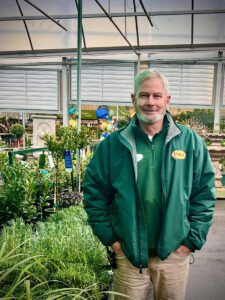Build an attractive garden for bees, butterflies and more.

John Jenkins, a manager at Pike Nurseries Buckhead, weighs in on pollinators, the gardens that attract them and how to create a welcoming pollinator garden of your very own.
What is a pollinator?
Bees are well-known pollinators, but more than 100,000 invertebrates, including butterflies, moths, wasps, flies and beetles, plus many mammals, birds and reptiles, also take on the job. Pollinators move from plant to plant, collecting pollen and nectar. As they move, the pollinators transport and deposit more pollen, fertilizing plants and allowing those plants to reproduce.
What are some of the best plants for a pollinator garden?
A few common ones would be bee balm, milkweed, hyssop, black-eyed Susan (rudbeckia), cone flower (echinacea) and lobelia.
What time of year should you plant one?
Spring is the best time! The nice thing is that most pollinator gardens can consist of perennials (rudbeckia, echinacea and bee balm) that come back each year for a more established garden. Annuals like lobelia, zinnias and salvia are good for the season March through September in Atlanta.
What kind of maintenance do these gardens require?
Very little once established. Newer gardens need good soil, a good water regimen and good fertilizer. I recommend Dr. Earth Annual Bloom Flower Garden Fertilizer.
Do you need a lot of space for one, or can you plant it in a container?
The answer is no, a lot of space isn’t required. Container gardening can have just as much pollination as a large garden. A lot of our customers live in apartment complexes and want to attract bees and butterflies, and container gardening can be fun to create and good for the environment.
Any more tips?
When sourcing plants, native plants are a good choice. They will thrive in the weather, moisture and soil in your region. Also, a big concern with a pollinating garden is to avoid any sort of chemicals that can harm the pollinator. Please read labels and look for a more natural insecticide.
Giannina S. Bedford is multi-faceted writer and editor. Her work covers design, travel, food and business. She’s penned Simply Buckhead’s home feature since inception and held a variety of editorial roles at the magazine. Her freelance work has appeared in Condé Nast Traveler, USA Today, Virtuoso Life, Hemispheres and TravelandLeisure.com. She also contributes regularly Atlanta Business Chronicle. Fluent in Spanish, Giannina was born in Miami and grew up in Brazil, Chile, Hawaii and Australia. She currently lives in Dunwoody with her two kids and husband.













